Ferdio is an infographic agency in Copenhagen, Denmark, and they're on a mission to inform the Internet about just how incredible our world really is.
To do so, Ferdio launched Factourism, a project dedicated to sharing facts that are 100% true and 100% fascinating. Tailoring them to fit online, Ferdo is illustrating the facts too, and the pictures are really cool.
Continue scrolling to check them out and fire up Ferdio's earlier submission to Bored Panda if you want more interesting trivia.
More info: factourism.com | Facebook | Instagram | Twitter
#1
Thanks to modern television screens, dogs are able to watch TV as well as humansHuman eyes can register around 55 images a second, while dogs, better at detecting quick movements, can see around 75 images a second. Older television sets were flickering around 60 times a second, good for humans but not adapted to dogs. New television screens have higher frequencies, so dogs can finally appreciate what happens on TV.
Image credits: factourism
#2
There are no stop signs in Paris(the last one was removed in the 2010s)With over 2 million inhabitants and a considerable amount of cars, the French capital has managed to do just fine without any stop signs, a sight that is usually very common in cities. At any unmarked crossing, drivers follow the “priority to the right” rule: cars coming from the right have the right of way. And of course, bigger intersections have traffic lights. It wasn’t always the case, with the last known stop sign disappearing from its street sometime between 2012 and 2014.
Image credits: factourism
#3
The Scots language has 421 words for snowThe Historical Thesaurus of Scots is a big dictionary of the Scots language, the native language of Lowland Scotland, in which academics have been compiling every single known word the language ever had (even though it focuses for now on vocabulary about the weather, sports and games, topics cherished by Scots). And a lot of them have to do with snow: 421 collected so far.
Image credits: factourism
#4
Some cities in the US used to have ‘ugly laws’, fining people $1 to $50 for how they lookedAnd by ugly, mayors mostly meant poor or with a disability. The laws were a pretext to force beggars, people with missing limbs or visible diseases, to stay away from public space. From the 19th century, several cities of the West and Midwest had laws like this. The last one, in Chicago, was only repealed in 1974.
Image credits: factourism
#5
If everyone on the planet consumed as much as the average US citizen, four Earths would be needed to sustain them{Weekend Repost}A set of data produced by the Global Footprint Network measures the ecological impact of the populations of different countries. Their footprint is calculated using statistics about the natural resources used to make the products they consume, as well as their carbon emissions. The researchers calculated the amount of land and sea necessary to sustain each country. The whole world needs 1.5 Earths to be sustainable the way we consume now, and if the entire humanity were to consume the way the United States does, we would need 3.9 Earths. Yet it isn’t the worst, as it is topped by Kuwait (5.1 Earths), Australia (4.8 Earths), the United Arab Emirates (4.7 Earths), and Qatar (4.0 Earths).
Image credits: factourism
#6
We hold 0.2 mg of gold inside us. An average person weighing 70 kilograms hosts 43 kg of oxygen, 16 kg of carbon, 7 kg of hydrogen… and 0.2 mg of gold.
Image credits: factourism
#7
Baby giraffes are born falling 1.5 metres to the ground. It’s no secret that giraffes are very tall animals, but a lesser known fact is that they give birth standing up. The first experience of a giraffe calf is a 1.5 metres (about 5 feet) high fall. Infants are then able to stand up in the first half hour of their life, and can run within 10 hours.
Image credits: factourism
#8
A sheep, a duck and a rooster were the first passengers on a hot air balloon1783. The Montgolfier brothers, Joseph-Michel and Jacques-Étienne, have been doing experiments with hot air balloons for about a year, when they got invited to make their first demonstration with passengers in Versailles, attended by the king Louis XVI and Marie-Antoinette. The passengers are three farm animals, chosen for their characteristics: a sheep that is not that different from a human, a bird that can fly and a bird that can’t. The balloon flew eight minutes and went 500 metres high, before landing peacefully. The animals were almost fine: the duck was not disrupted, the sheep was eating its hay like nothing happened, but had sat on the rooster, breaking its beak. They became honoured residents of the royal menagerie. A month later, the brothers flew a new balloon, this time with people in it.
Image credits: factourism
#9
The IKEA catalogue is as widespread as the BibleWith a print run of more than 200 million copies for each edition, the IKEA catalogue is a bestseller — if it was being sold, that is. It is one of the top most printed books, along with the Bible, the Quran, and Harry Potter.
Image credits: factourism
#10
There is a polar bear jail in CanadaThe town of Churchill in northern Manitoba, visited by a thousand polar bears in the summer, has a special facility for the most troublesome or dangerous of these special visitors: nothing else than a jail, comprising about fifty cells where the bears are locked up to one month and without food. After that, they are flown far away from the town with a helicopter. The theory is that this would be memorable enough for the bear that they won’t want to approach the town ever again, even though they cannot find food anywhere else any more since the ice in the region has melted and their usual food, seals, are now not that common.
Image credits: factourism
#11
Turning left puts drivers against the flow of vehicles coming the other way, which leads them to wait 30–45 seconds each time with the engine running. A new routing system introduced a few years ago, which calculates routes favouring right turns, saves the whole UPS 10 million gallons (38 million litres) of fuel every year. On top of that, right turns are more safe, leading to only 1.2% of crashes instead of 22.2% for left turns.
Image credits: factourism
#12
The most frequently used password is 123456{Weekend Repost}“123456” has been for several consecutive years the most widely used password, according to a list collecting all those which were hacked and leaked. The top 10 also includes the very imaginative “123456789”, “12345678”, “1234567”, and “12345”. As for the second most used password, it is “password”.
Image credits: factourism
#13
29% of San Francisco’s air pollution comes from Asia. Geochemists have analysed the air of the San Francisco Bay Area, both from an urban spot and from a coastal location, looking at pollution particles smaller than 2.5 microns over the course of six months. They have found that 29% of these were 208Pb particles, a specific form of lead that is characteristic of East Asia.
Image credits: factourism
#14
Cheerleading started as an all-male activityCheerleading in the US can be traced back to the late 18th century, when male students rebelled and, besides taking part in riots, also started practising sports in universities. One of the earliest documented examples of cheerleading dates from 1877, happening at Princeton University. It’s only in 1923 that the University of Minnesota allowed women to join, and most universities followed much later, in the 1940s. By the 1970s, most cheerleaders were women.
Image credits: factourism
#15
Play-Doh was originally sold and used as a wallpaper cleaner. The company making Play-Doh, then called Kutol, was mainly producing soap, until the supermarket chain Kroger ordered wallpaper cleaner, a common product at a time where households were heated with dirty coal, from them in the 30s. They started producing the clay-like cleaner, and it soon became their main product. However, the use of wall cleaner declined greatly by the time the 50s arrived. That’s when employee Kay Zufall came in: she had seen a magazine wallpaper cleaner used as a material for kids to model Christmas decorations. She suggested selling the dough as a creative toy for kids. They removed the detergent in it, added colouring and an almond smell, and finally marketed it as Play-Doh.
Image credits: factourism
#16
Tennis players produce up to 3 litres of sweat an hour. A tennis player can create more sweat than their body is able to replace during a 5 hours match, especially when the weather conditions are very hot. Players have to be selective about what balls to put effort into, in order to reduce their own heat and not outdo what their body can take.
Image credits: factourism
#17
Several species of ants, attines, started farming 55 to 60 millions of years before humans did. Their favourite food? Fungus. They organise themselves around cutting grass and leaves, bringing them back to their colony, watching after fungus growing on the harvested crop, and then collecting and eating the fungus. The fungus species evolves along with each ant species.
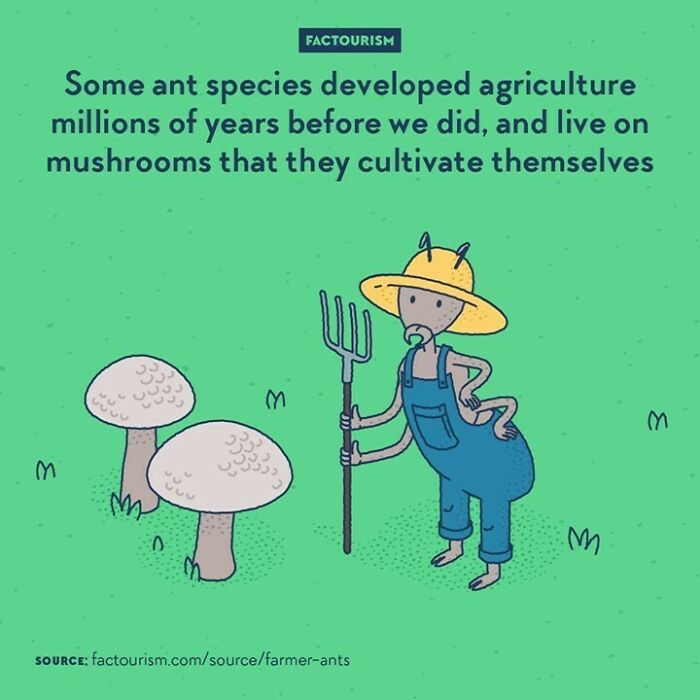
Image credits: factourism
#18
Crematoriums produce excess heat, an issue which is often solved by using cooling towers, which consumes in itself a lot of energy as well. Several establishments in Denmark and Sweden have therefore decided to make use of the surplus heat instead. It is a sensible and environmentally-minded solution, although when that energy is sold to power companies, it has been reckoned that the practise might be breaching the ethical code of the International Cremation Federation, which states that “the products or residue of a cremation shall not be used for any commercial purpose”. However, after much deliberation, the Danish Council of Ethics decided that it was perfectly ethical to recycle cremation heat.
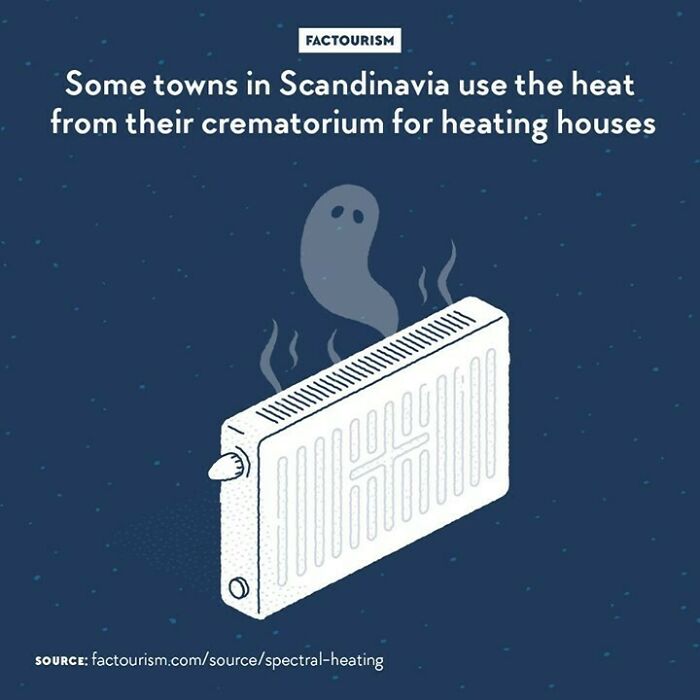
Image credits: factourism
#19
Studies have shown that life is on average shorter for left-handers. One that looked at 1,000 Californians found out that the left-handed portion died on average 9 years younger. They discovered that left-handers are also five times more likely to die in an accident.
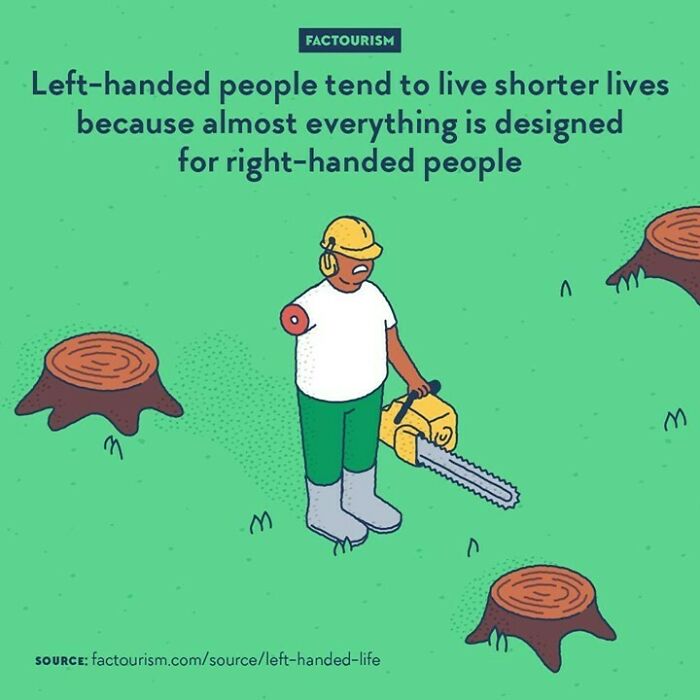
Image credits: factourism
#20
Blood makes a loop around your body 1,500 times a dayBlood circulates through the body continuously: starting from the heart, it irrigates all parts of the body, passes through the lungs for a new supply in oxygen, and gets to the heart again before starting the tour again. Our 5 litres of blood recirculates about 1500 times each day, and that without exercise that can also increase the number of loops.
Image credits: factourism
#21
The visibly never ending shelf-life of honey is surprising: archaeologists have excavated honey from thousands of years ago, and it’s still unspoiled. One reason is that as a substance, honey has very low moisture, an environment in which very few bacterias can survive. Another is that it is very acidic, again a characteristic that bacterias don’t like. Finally, the bees produce hydrogen peroxide from the nectar, a known antiseptic, to the point that honey can be used in traditional medicine to treat wounds against infection. In a word, honey is hell for bacterias and other microorganisms, so as long as it is sealed and not mixed with anything, they won't dare grow on it and spoil it.
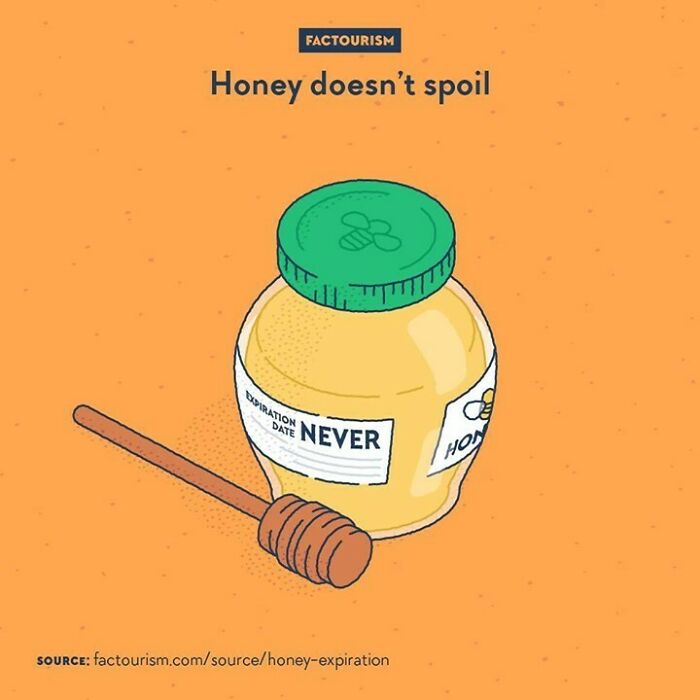
Image credits: factourism
#22
Don’t mess with a crow: they will remember your face. Researchers have been either nice or not nice to crows for scientific purposes, all while wearing different masks. Crows were able to remember which masks were not nice to them, and scans of their heads showed that a region of the brain associated with bad memories — until now only studied in mammals — was activating in the presence of a face they remembered as threatening.
Image credits: factourism
#23
Plants can communicate with one another. Some correspond with each other by emitting volatile organic chemicals, some even send electric signals. The meaning of the messages can have different goals, such as alerting about insects, advising nice directions for growing, regulating temperature, etc.
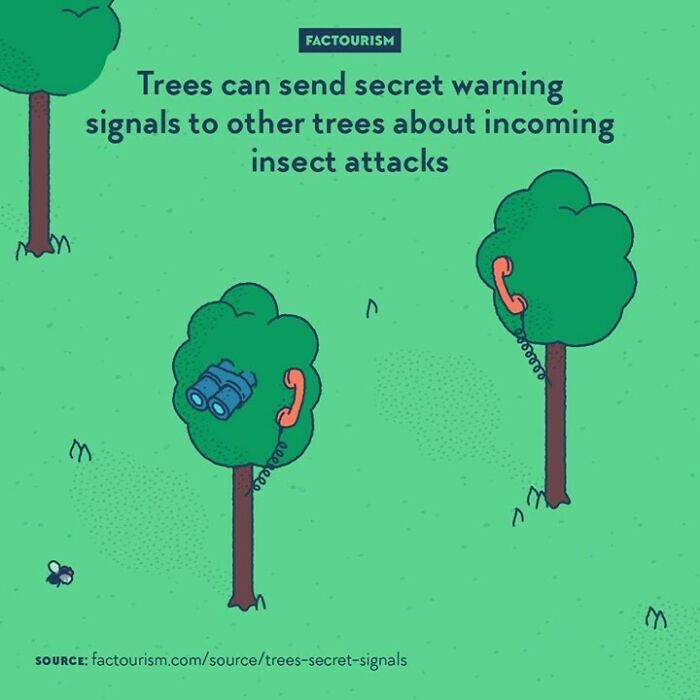
Image credits: factourism
#24
Queen Elizabeth was a mechanic during WWIIDuring the second world war, Elizabeth II, then princess, now queen of the United Kingdom, was working full-time as a mechanic and driver to help the war efforts. She was 18 in 1944 when she decided, against her father’s (King George V) initial opinion, that she would join the Auxiliary Territorial Service, a women’s branch of the British army. A photo from that time has her fixing a car engine while her mother Queen Elizabeth I is visiting.
Image credits: factourism
#25
Professor of mathematics and statistics at Stanford University and former professional magician Persi Diaconis and his fellow researchers Susan Holmes and Richard Montgomery once published a scientific paper called “Dynamic bias in the coin toss”. In it, they explore the odds of a coin flip, using high-speed photography, a custom coin-tossing machine and statistical methods. They arrived at the conclusion that 51% of the time, the coin lands in the same direction it was thrown,
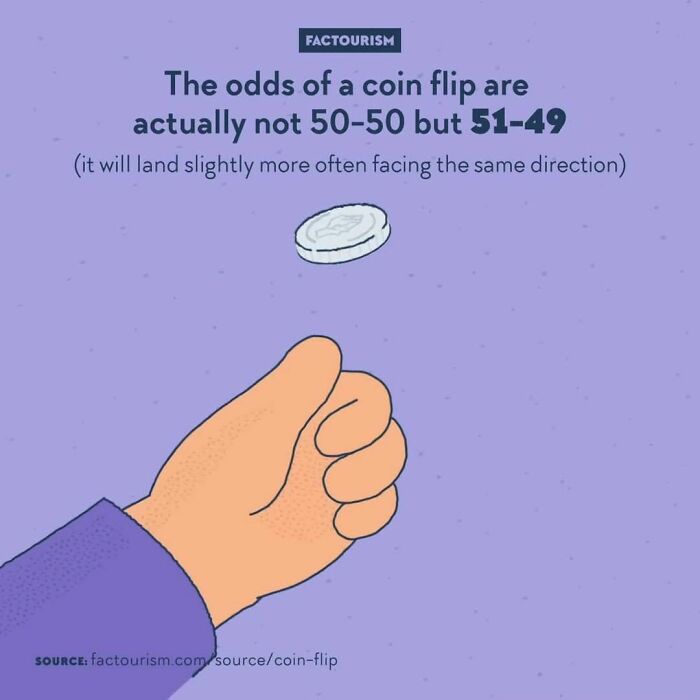
Image credits: factourism
#26
Researchers from the University of Arizona have estimated that 90% of “clean” cups in an office actually carry germs. 20% are identified as bacteria usually present in faeces, such as coliform and E. coli, revealing how unhygienic office settings and behaviours can be.
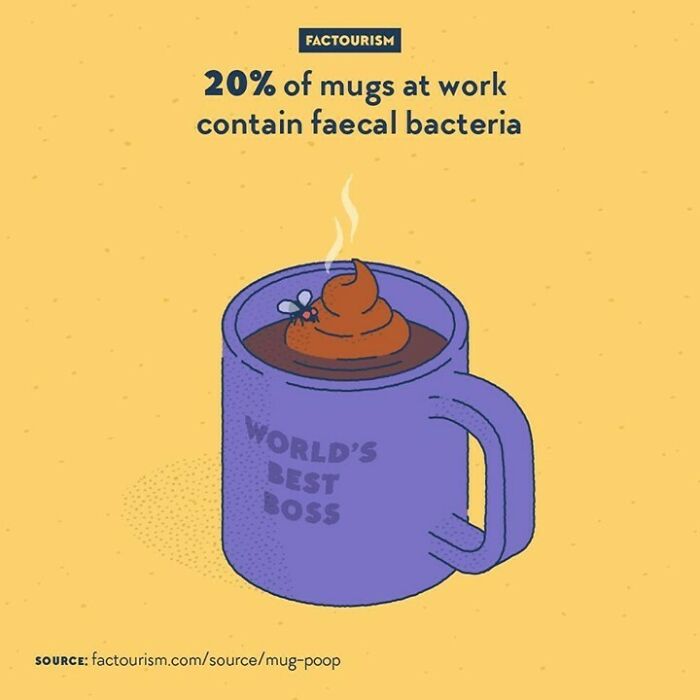
Image credits: factourism
#27
Pigeons, birds with a pretty good visual memory, were trained at classifying mammograms: some with and some without cancerous cells. If they were right, they would be rewarded with a treat. After two weeks, they were able to be 85% accurate. And when using four birds working on the same images, the accuracy of diagnosis went up to 99%. The birds’ newfound medical skills could be used to improve medical imagery data.
Image credits: factourism
#28
A donut-shaped planet is technically possible{Weekend Repost}Even if extremely unlikely to happen naturally, the possibility of a planet shaped as a torus — the true name of a doughnut shape — is not physically impossible. Researchers have made simulations and calculated the gravitational forces implicated, and everything seems alright. The weather would be very peculiar, and there could even be moons with orbits going through the central hole.
Image credits: factourism
#29
Wine glasses are seven times larger than they used to be{Weekend Repost}The average wine glass from the 1700s was about 66ml, against 417ml in the 2000s. That is a finding of research conducted by scientists from the university of Cambridge. Comparing 411 glasses from the past 300 years found in museums, catalogues, and other sources, they found that their size got six to seven times larger during that time. The larger increase has been happening in the last few decades, leading to the question of what it can mean in terms of alcohol consumption.
Image credits: factourism
#30
From the 1200s, the Tower of London started to host a menagerie of exotic animals, the ancestor of what would eventually move and become the London Zoo in the 1830s. The place was finally opened to the general public under Elizabeth I. The entrance was half-pence, but was free if you brought a cat or a dog.
Image credits: factourism
#31
The powerful producers of the MGM film required the teenage actress to look as young and thin as possible so as to fit their whim, so they imposed on her a strict diet of some soup and coffee, along with an abundant amount of cigarettes so that would not get too hungry. On top of that, she was put on pills to reduce her appetite and to keep her awake during the long filming hours and a forced lack of sleep. Not exactly “wonderful”.
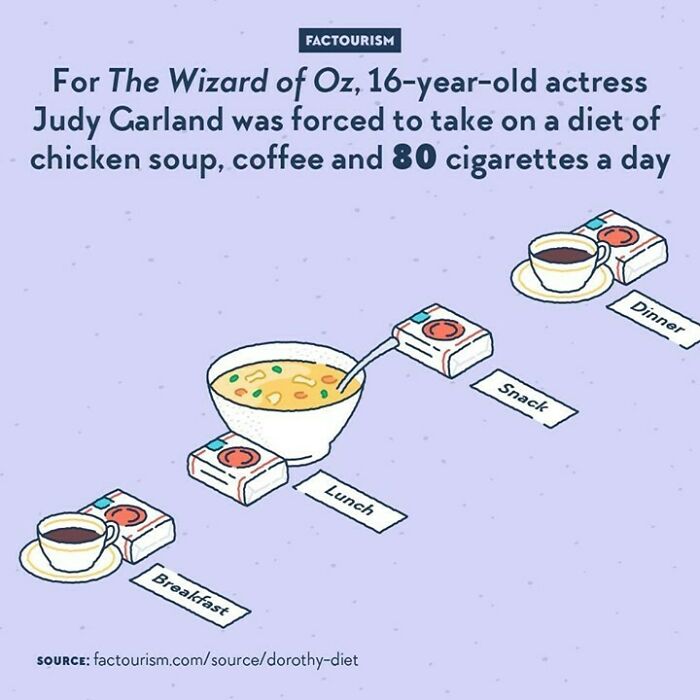
Image credits: factourism
#32
#33
The oldest known customer complaint was written on a clay tablet 4000 years ago in Mesopotamia{Weekend Repost}The year is 1750 B.C. Nanni writes to their provider in copper, a merchant named Ea-Nasir. Not only the copper was of such bad quality that Nanni had to refuse it, but the money that was paid in advance was never refunded, even after sending several messengers, through a war zone on top of that. ”[How can] you treat somebody like me with such contempt?”, Nanni traces angrily on a clay tablet. The message is written in the Akkadian language, using cuneiform letters.
Image credits: factourism
#34
There are a lot of ingredients in a lipstick: for instance beeswax, Carnauba wax from palm trees, lanolin from wool, castor oil from beans, any dye either from vegetal, animal, or synthetic origin, and sometimes guanine, a substance that can be found in fish scales and gives the product a pearl-like appearance
Image credits: factourism
#35
Canada has a strategic maple syrup reserveThe production of maple syrup is a crucial industry for Canada. But also a risky one, as maple trees are depending on precise weather, the amount of syrup varying a lot from year to year. Maple syrup reserves were therefore put in place to smooth out difficult years. In 2012, in what might be the greatest Canadian heist, $30 million dollars worth of syrup was stolen from one reserve.
Image credits: factourism
#36
When it was created in 1929, 7-Up had a completely different name: “Bib-Label Lithiated Lemon-Lime soda”. It is the “lithiated” part that interests us here: an ingredient of the drink was lithium citrate, a compound well known to people with bipolar disorder as it is one of the most established drugs to stabilise mood states. It is said that its presence in 7-Up did affect the dinker’s mood, until it was removed in 1948.
Image credits: factourism
#37
You are one or two centimetres taller when you get out of bed in the morning All the pressure put on our spine during the day, compressing our cartilage down, makes us a little smaller when we go to bed. Your body can finally relax during the night, finding again its initial height, usually 1-2 cm more than on evenings.
Image credits: factourism
#38
A jellyfish’ body is like a jelly structure inflated with water. In fact, only 2% of the creature is not water. So if washed ashore under the sun, most of a jellyfish will evaporate: its only remains being very thin and transparent, what’s left of its organs, skin and tentacles.
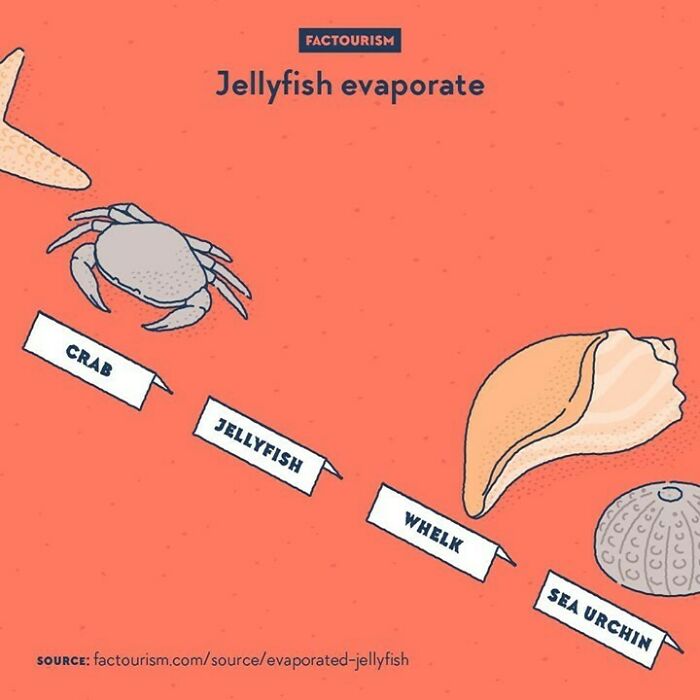
Image credits: factourism
#39
Judges are more likely to grant parole after lunch{Weekend Repost}Researchers have analysed the decisions of eight judges in the course of more than 1000 rulings. They found out that prisoners in the beginning of the day or just after the lunch break are two to six times more likely to get a release than the prisoners at the end. The probability of a favourable decision is around 65% in the early morning and early afternoon, and decline steadily to nearly zero as the time passes.
Image credits: factourism
#40
The United States Supreme Court building, built in 1935 in Washington D.C., does not only house a courtroom. It has five floors, the last one being a gym with a basketball court, referred to as “the highest court in the land”.
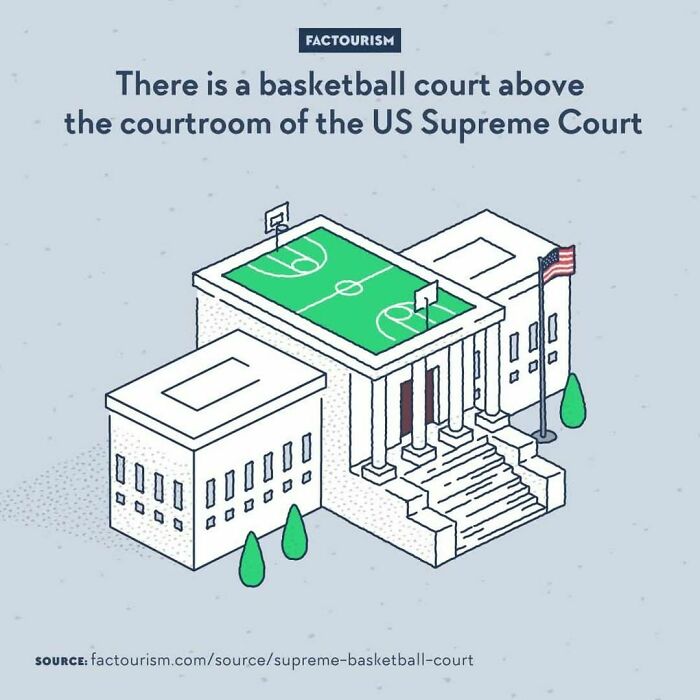
Image credits: factourism
#41
The world’s largest pizza was about 3 times as big as a basketball courtThe Nazionale Italiana Pizzaioli has held since 2012 the world record for the largest pizza, with a surface of 1,261.65 m². It’s also gluten-free. For reference, a professional basketball court measures 420 m². The same organisation also brewed the world’s biggest cappuccino – a 2,350 litres coffee cup – and a variety of other biggest Italian specialities.
Image credits: factourism
#42
Cacao plants are cultivated in a very narrow strip on the globe: they grow only around the equator, in places that have relatively stable temperature and humidity during the year. But in the next few decades, the climate of these regions is expected to become warmer and dryer, leaving the cacao nowhere to be grown. Giant chocolate companies like Mars are working with scientists to find solutions, like making GMO cacao plants able to withstand these conditions, but we are certainly reaching the end of chocolate as we know it.
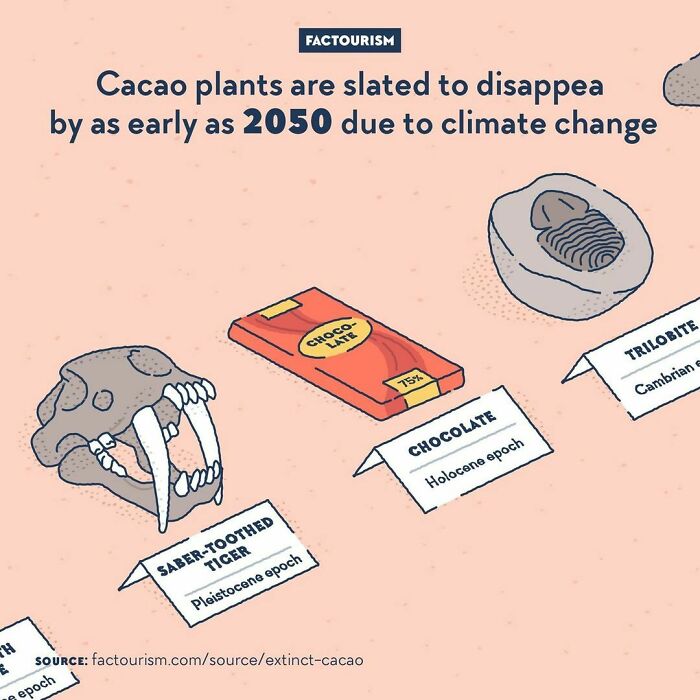
Image credits: factourism
#43
Fanta was created in Nazi Germany due to difficulties importing Coca-Cola syrup during World War II {Weekend Repost} Coke was present in Germany since the late twenties, and continued operation when the nation was overtaken by Nazism. When the war broke however, some key ingredients couldn’t be imported. To keep the company running, its executives launched a new drink made from the leftovers of other food industries, Fanta.
Image credits: factourism
#44
Before the can opener was invented, people used chisels and hammers{Weekend Repost}Although food started to be tinned as early as in the late 18th century, no dedicated tool for can opening was produced before at least the 1850s. More thought was given on how to preserve the content than on how to retrieve it. So people used chisels and hammers, and early instructions advised to do so.
Image credits: factourism
#45
Kiwis are possibly evolving to become sightless. A recent study on 160 birds discovered that a third of them had eye issues and several were even born blind… while living perfectly well their kiwi life. It is simply possible that they don’t need a vision that much: they live at night, have no predators and a good sense of hearing and smell. After all, they are already doing fine being wingless.
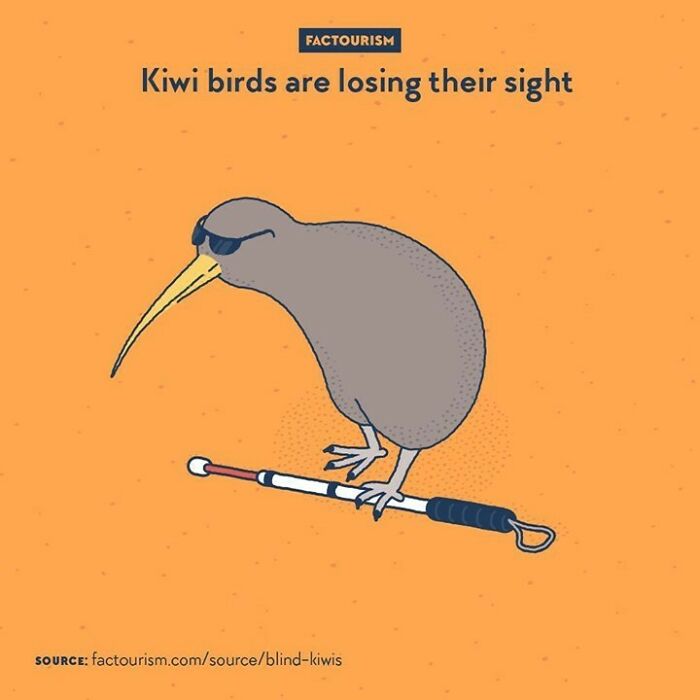
Image credits: factourism
#46
Researchers have sampled the body odours of both subjects who had eaten normally and subjects who had eaten a lot more garlic than the first ones. Their odours were then rated by a separate panel of volunteers. The smells of the garlic-eaters were evaluated more pleasant, more attractive, and less intense than the others. It’s worth noting that: 1. The subjects were all men and the raters were all women; 2. The study only included body smell and not breath smell.
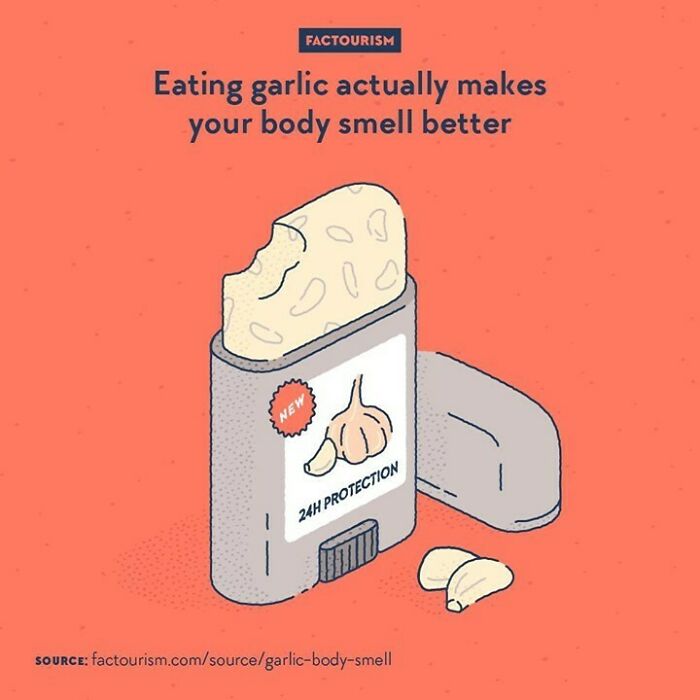
Image credits: factourism
#47
Pepper is a spice from South India, which has long been used as a medicinal plant and as a cooking ingredient. It was already traded and used in Europe during Antiquity. By the middle ages however, the rarity of the spice on the continent made it very expensive. Later, these difficulties to import black pepper and other spices made Christopher Columbus sail West to access India bypassing the Ottoman Empire. When his expedition arrived in the Americas instead, they naturally didn’t find black pepper there. But they found out about chilli peppers instead, which was brought back and eventually found its way to India, where it became a cornerstone of the local cuisine.
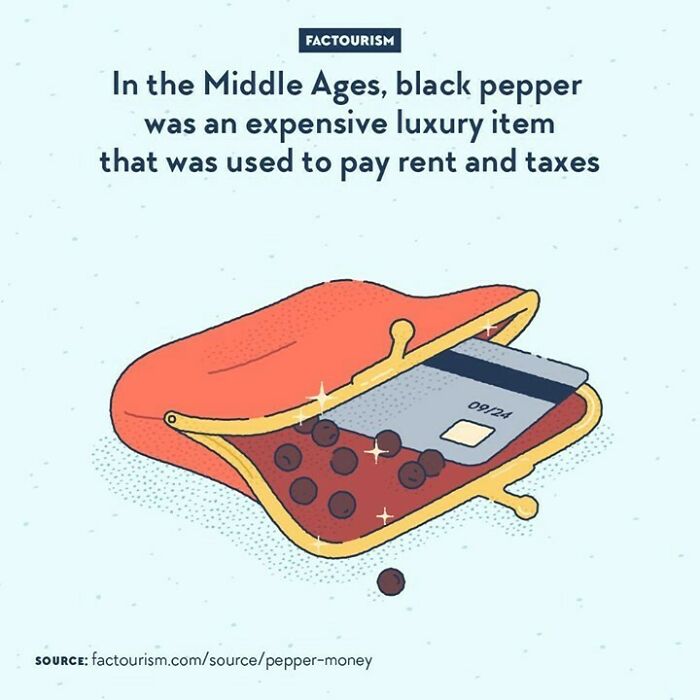
Image credits: factourism
#48
The word ‘avocado’ comes from a Native Central American word meaning both avocado and testicleIn Nahuatl, an Aztecan language spoken in Central America, the fruit has been called “āhuacatl”, the same word that is used for testicles. After all, both have obvious similarities. When the Spanish invaders colonised the region, they took the word and made it “aguacate”, which later became “avocado” and was borrowed in turn into the English language.
Image credits: factourism
#49
The sound of a black hole is a B-flat note(57 octaves lower than the middle B)Astronomers have been measuring the sound waves emanating from a black hole located in the Perseus galaxy cluster. The black hole continuously hums a single note: a very low B♭. The drone has too deep of a frequency to be heard by human ears, as it would be located 57 octaves lower – i.e. several meters to the left – from the middle C note of a piano.
Image credits: factourism
#50
Scientists can grow teeth out of the stem cells found in urineExtracting stem cells from urine samples, researchers at the Guangzhou institute of biomedicine then proceeded to grow artificial teeth from there. As the teeth were not as hard as natural teeth, and the cells not in their best state, urine might not be the best source: further research is needed. But growing teeth in a lab might become a viable way in dentistry to replace a damaged tooth.
Image credits: factourism
#51
A spa house in Japan is offering ramen noodle baths{Weekend Repost}The Yunessan Spa House in Hakone in Japan has bathtubs full of soup, pork broth and noodles. It is meant to boost collagen and increase metabolism.
Image credits: factourism
#52
We sigh every 5 minutes on average, without which our lungs would collapseHumans sigh 12 times per hour, and it’s not always related to being tired or exasperated. Scientists have identified this regular sighing as a life-sustaining reflex, made to prevent the alveoli in our lungs from collapsing. If alveoli collapse, they would not be able to reinflate, causing the lungs to fail.
Image credits: factourism
#53
When Steve Jobs and Steve Wozniak created Apple in 1976, the first of the two Steves came up with the name Apple for two reasons: he had a nice experience working in an apple orchard a few years earlier, and the name would get them before Atari in the phone book, the company where Jobs was working previously.
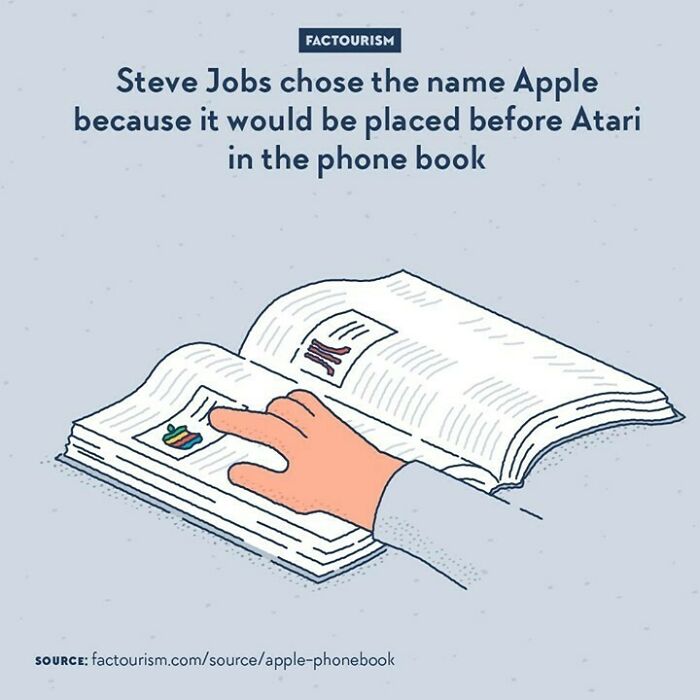
Image credits: factourism
#54
A central part of academic research is all about writing papers. Researchers methodically write down in detail everything they study into articles, carefully structured and referenced, including citations of previous papers on the subject. Once written, they submit their work to scientific journals, academic publications that are often focusing on a specific research topic. The journals’ editors then assemble a team of peer reviewers, scholars whose expertise in the field is the reason they are specifically chosen to read and comment the submitted article. If the papers are approved and the original authors make appropriate changes after receiving the reviewers’ comments, the papers are finally published in the journals, alongside all the world’s latest research. About half of the articles then proceed not to be ever read by anyone whatsoever. That is how science and human knowledge advances.
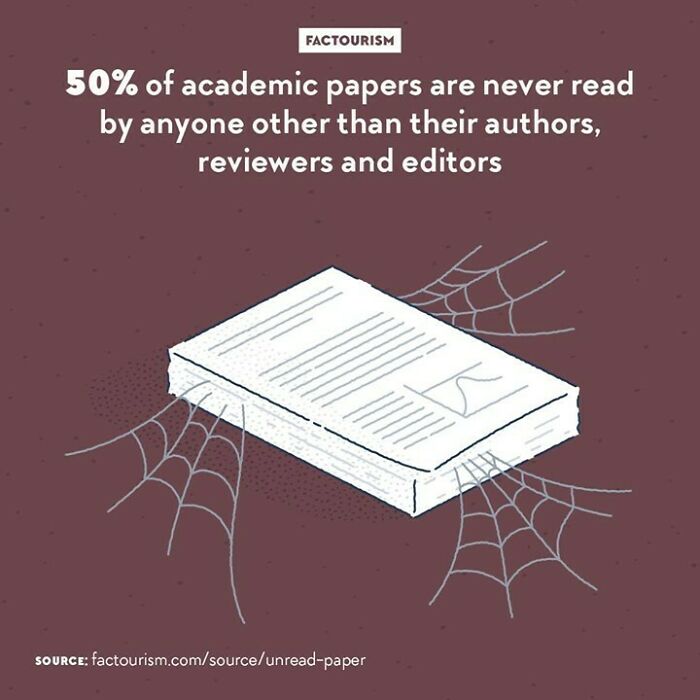
Image credits: factourism
#55
A study by the University of Michigan found that cheese and dishes containing cheese ranked high in their experiment about addictive food. One of the major components of cheese is casein, which produces casomorphins when digested. Casomorphins are opioids, and acts on the brain’s opioid receptors, the same that get activated when consuming opium or morphine for instance.
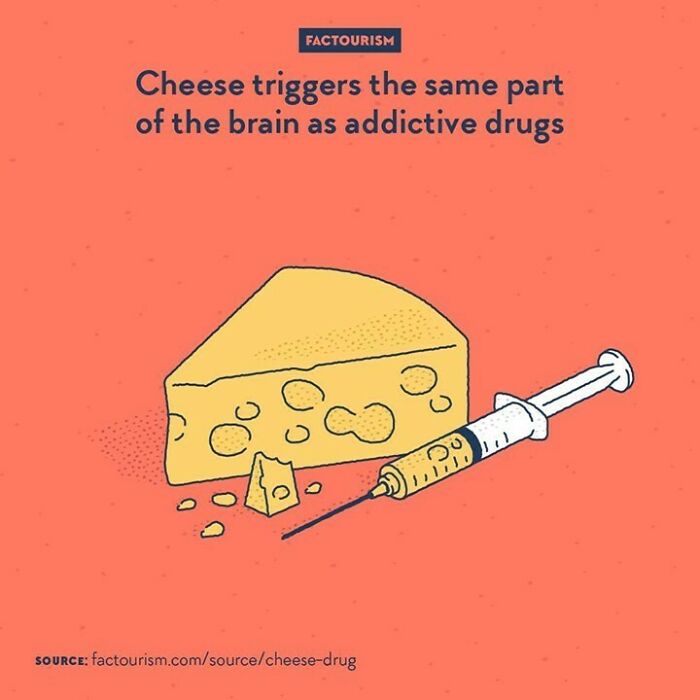
Image credits: factourism
#56
In his office in Down House, in Kent, England, Charles Darwin had laid out all the specimens he collected during his research expeditions all around the room. But getting up, moving his heavy armchair, and sitting down again and again all the time, comparing specimens from table to table, wasn’t really practical. So he fastened four swivel caster wheels to his armchair’s feet, and could then roll around the study easily, effectively creating the first known wheeled office chair.
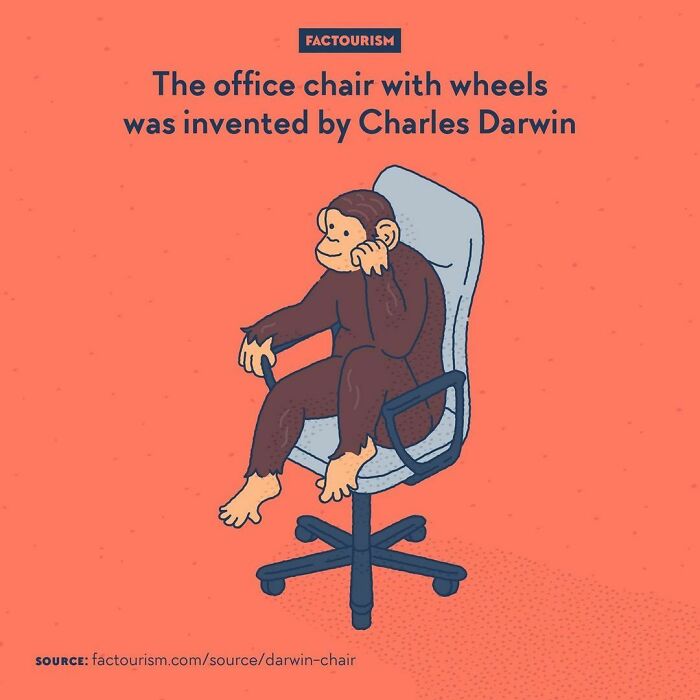
Image credits: factourism
#57
The world’s longest pedal-powered tandem bicycle has 52 seats{Weekend Repost}It started with two sisters fancying the same boy, arguing about which of them would ride with him on their tandem bicycle. Their father welded another frame and seat to solve the issue. They later got carried away and added seats after seats to accommodate all the family and their friends. The eventual “bi”cycle is 42 metres long, has 52 seats, and 26 wheels.
Image credits: factourism
#58
The first shopping cart was made from a folding chair with a basket on the seat and wheels on the legsIn 1936, Sylvan Goldman was the owner of a self-service store, in which customers were picking and carrying their own groceries, a relatively new concept at a time when many shops still had a behind-the-counter model. Sitting on his wooden chair thinking about how customers could carry more groceries at a time, he had an eureka moment, put a basket on the chair and imagined some wheels. With the help of a mechanic, Fred Young, they finally built the first prototype, with a metal frame and two wire baskets: a huge success that was soon adopted by other stores and led to the carts we know today.
Image credits: factourism
#59
A lemon will float in water, but a lime will sinkThe density of a lemon is less than the one of a lime: compared to water, a lime is denser. That’s the reason why they will react differently if they’re placed in water.
Image credits: factourism
#60
Tiny mites are living and having sex on your faceThe human skin is home to several species of microscopic mites, from Demodex folliculorum who lives in the pores to Demodex brevis who settles in oil glands. Related to spiders, these mites are born on your skin, live on your skin, and die on your skin after their short 2-week lives. In the meantime, they mate with each other, males visiting females who in turn lay eggs in your pores.
Image credits: factourism
#61
A Japanese toilet brand has built a motorcycle that runs on excrementThe toilet manufacturer Toto has created a prototype of a three-wheeled motorcycle, the Toilet Bike Neo. Its fuel? Bio-gas created by purifying methane, itself extracted from livestock “waste”, i.e. poop. Three years of research was needed to develop the vehicle.
Image credits: factourism
#62
In 1930s London, babies were dangled out of windows in “baby cages”Fresh air. That is the reason why London parents living in flats a hundred years ago would purchase cages similar to chicken coops, hang them by the window, and put their little kids in it.
Image credits: factourism
#63
Pen-tailed treeshrews spend every night drinking fermented nectar (drinking the human equivalent of 9 glasses of wine a night)A little mammal living in Southeast Asia and Oceania, the pen-tailed treeshrew is the only known animal, besides humans, to consume alcohol regularly. In fact, the threeshrews drink fermented nectar from flowers every single night, as it is their main source of nutrition. Their favourite brewery? The bertam palm plant, which produces drinks with up to 3.8 percent concentration of alcohol. And last but not least: they don’t show any sign of being drunk, suggesting a more efficient metabolism than ours in terms of alcohol detoxification.
Image credits: factourism
#64
Pineapples were status symbols in 18th century Europe(they were so expensive that people rented them for the evening to show off at parties)Originally from South America, Christopher Columbus brought back pineapple to Europe in the 15th century, but they didn’t acclimate well to the local conditions. By the 17th century, pineapples were still rare there and considered very luxurious, one fruit costing up to 7000€ in today’s money.
Image credits: factourism
#65
Our eyes are closed for roughly 10% of our waking hours{Weekend Repost}We blink 15 to 20 times a minute, more than what we need in order to keep our eyes moisturised. So why are we blinking that much? Researchers from Osaka University in Japan discovered that the brain switches to some sort of idle state during the blink. Not having to focus and process any visual information for a fraction of a second, the mind gets some rest.
Image credits: factourism
#66
Fish are getting dumped from aeroplanes in order to repopulate lakesLakes needing more fish can get their new population to fly over: aerial firefighting airplanes get their tank full of water and fish, and they all get dropped when the aircraft flies over their destination. Practised for decades already, the practise is meant to be relatively harmless for the fish.
Image credits: factourism
#67
Bank notes that are too old and torn or written on get removed from circulation and end up being shredded. In the US, it is $6,000,000 that are cut in pieces daily. These piles of small bits of money used to get in landfill, but are now taken to a compost facility where they are blended with other waste and turned to soil.
Image credits: factourism
#68
A cow and bison hybrid is called a ‘beefalo’Cows and bisons are both bovines and can breed with each other. They are natural instances of it happening, but it is mainly practised by livestock farmers, usually with a male cow and a female bison. The appearance of the animal is usually close to cattle, with specimens that are more bison-like sometimes named ‘cattalo’ as well.
Image credits: factourism
#69
Image credits: factourism
#70
The birth rate of pandas is really low. In the wild, after a failed pregnancy, female pandas sometimes continue to behave like they were still pregnant, a phenomenon not entirely explained. In captivity, that behaviour has sometimes been interpreted as a way to access all the perks that pregnant animals get in zoos, extra comfort and food. It estimated that 10–20% of pregnancies in pandas are make-believe.
Image credits: factourism
#71
The buzz of flies is made by their wings flapping — in the case of a housefly, 190 times a second. In musical terms, this frequency sounds to human ears just like a pitch along the F major scale. This key is believed to be one of the most heard in nature.
Image credits: factourism
#72
Cows that are called by name produce 258 litres more milk per year than those who aren’t{Weekend Repost}Cows that are stressed make less milk because of the interference of hormones, and the ones that are anxious are more likely to resist milking. A relaxed and cared about cow, however, is going to give more milk. A study conducted across British cows in 500 hundreds farms showed that the ones that had a name, usually alongside being gently stroked and talked to, got on average 258 more litres of milk a year. Baby cows that are not yet of age for making milk are also more likely to give a good amount of milk later on if they are treated as individuals rather than ignored.
Image credits: factourism
#73
May 11, 1947, Le Bourget airport, Paris, France. Winston Churchill, then between his two mandates as a prime minister of the UK, smokes half a Cuban cigar and stub it out in an ashtray before embarking on his plane to Northolt, UK. That’s when William Alan Turner, an airman working on this flight, discreetly got the cigar out of the ashtray and brought it home as a souvenir for flying the British statesman. Fast forward October 11, 2017, RR auction house, Boston, USA. The cigar resurfaces. A Floridian collector buys it for no less than $12,000.
Image credits: factourism
#74
If today’s marshmallows are mainly made from gelatin, marshmallow is at first a flowery plant, which has been used for centuries. It has been known during Antiquity as a medicinal remedy for about everything, and served as food during famines. But the first people to use it in a sweet confection were the Ancient Egyptians, who mixed its sap with nuts and honey. The treat was only for the nobility and gods, though, and didn’t look at all like what we know today. It’s only in the 19th century that marshmallows would start getting closer to the familiar candy, and gelatin started to be used instead of plant extract. In the 1950s finally, marshmallows took their current form with a newly invented process pressuring the mixture to make it more airy and reaching its unique texture.
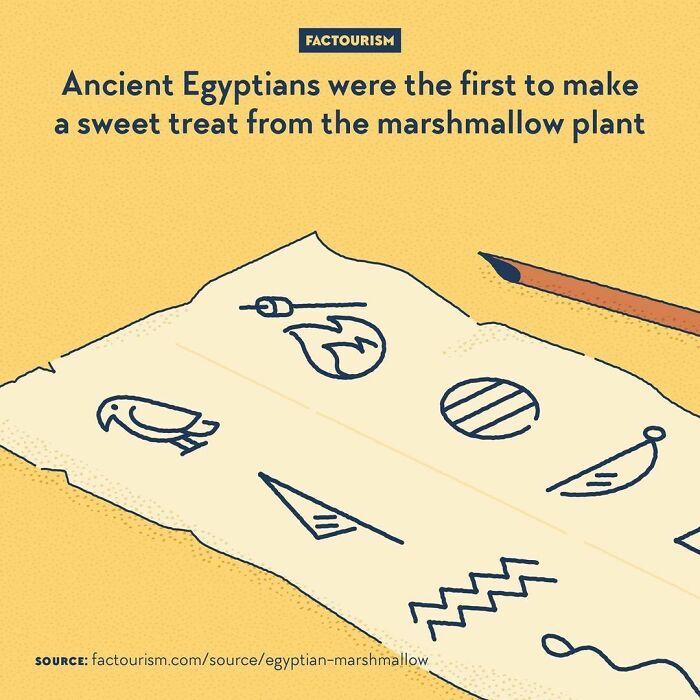
Image credits: factourism
#75
Tintin is called Tantan in Japanese because ‘Tintin’ would read as the slang for ‘penis’An unfortunate name: Tintin in Japanese would be written ちンちン (pronounced “chin-chin”), a word already used to say ‘penis’. Rather than wearing this ridiculous name, the famous Belgian character was renamed タンタン (“tan-tan”), with his adventures published in Japan since the late sixties.
Image credits: factourism
#76
Sultan from 1623 to 1640, Murad IV banned drugs in his empire. Alcohol: prohibited. Tobacco: forbidden. And coffee? Outlawed too. In fact, Murad IV made it personal: it is told that he would disguise himself as a layman, walk around town with his sabre, and behead any coffee drinker who would cross his way. One of the main reasons behind his crusade against coffee was the popularity of cafés, where men would gather, chit chat, listen to poetry, play chess and backgammon… and not go to the mosque. Was death penalty enough to dissuade coffee drinkers? Absolutely not. Coffee remained very popular, and religious scholars ended up accepting the fact that people were not going to give up on it. As for Murad IV, he died of cirrhosis, possibly because of drinking too much alcohol himself.
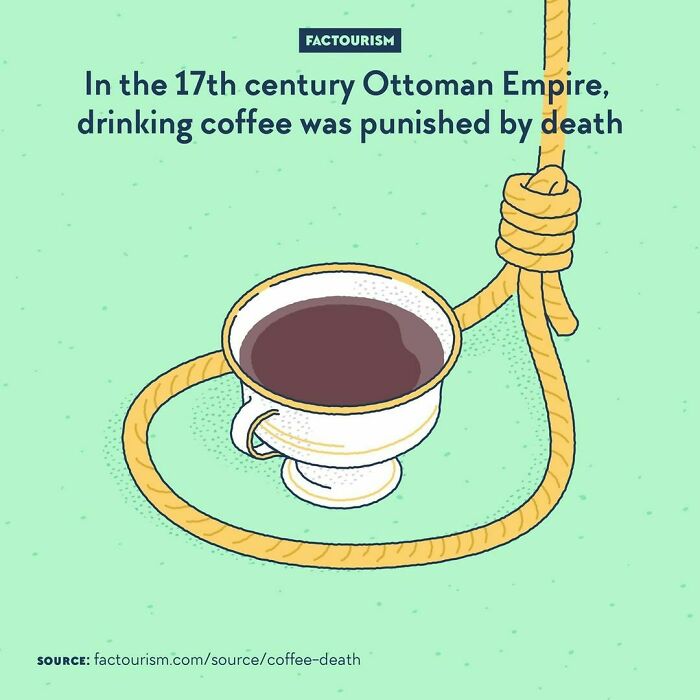
Image credits: factourism
#77
When English immigrant William Colgate founded his company in 1806 in New York City, he was making soap and candles. It is only in 1873, well after his death, that the company started to sell toothpaste, originally sold in jars.
Image credits: factourism
#78
Most starfish can regenerate bits of their body if damaged, and some can regenerate a full limb if lost. A few however can even regrow their full central body from a single remaining limb. The process can take months to years, and the animal is very vulnerable during that time. Some species use that ability for reproduction: lose a limb, let it regrow a body, you’re now two.
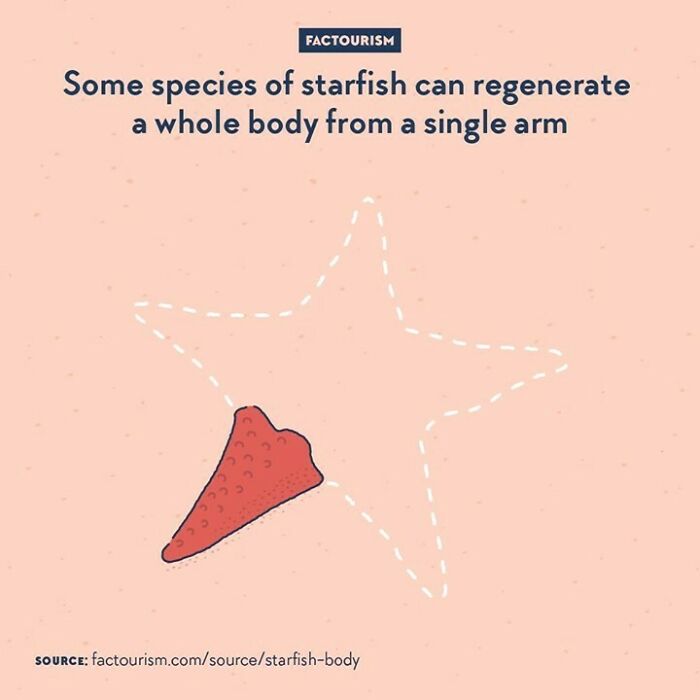
Image credits: factourism
#79
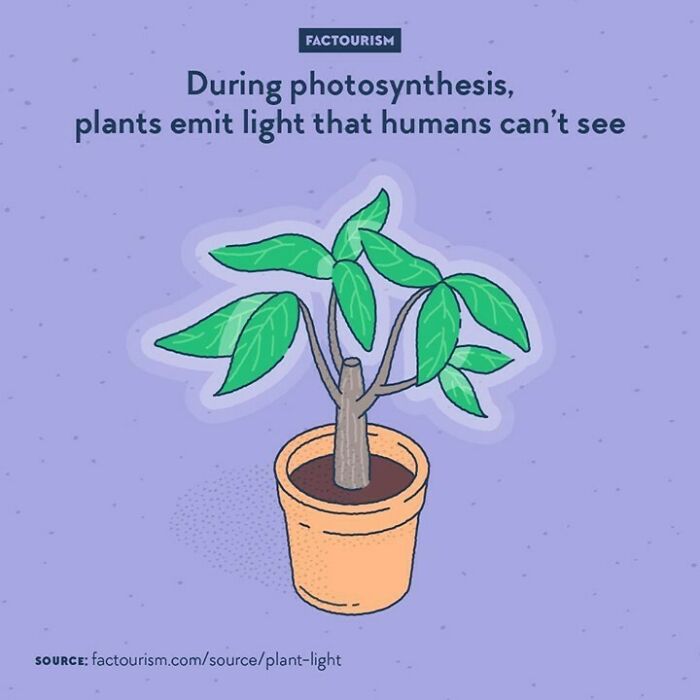
Image credits: factourism
#80
Batman, capital of the Batman province and home of the Batman University and the Batman football club, is a city in southeastern Turkey. Originally a village named Iluh, it grew into a city in the 1950s and was renamed after the river flowing nearby. The origin of the name is unclear, though it might be a contraction of “Bati Raman”, a local landmark. Worth noting is that a thousand kilometres away from the city lays another municipality: the village of Batman, in Iran.
Image credits: factourism
#81
The history of printing is rich and black-and-white. It includes this bit from the 1860s: William Bullock, an American inventor known for improving the rotary press and turning it into a machine capable of printing up to 12,000 pages an hour, died after he kicked his invention and got his leg caught and crushed in the device.
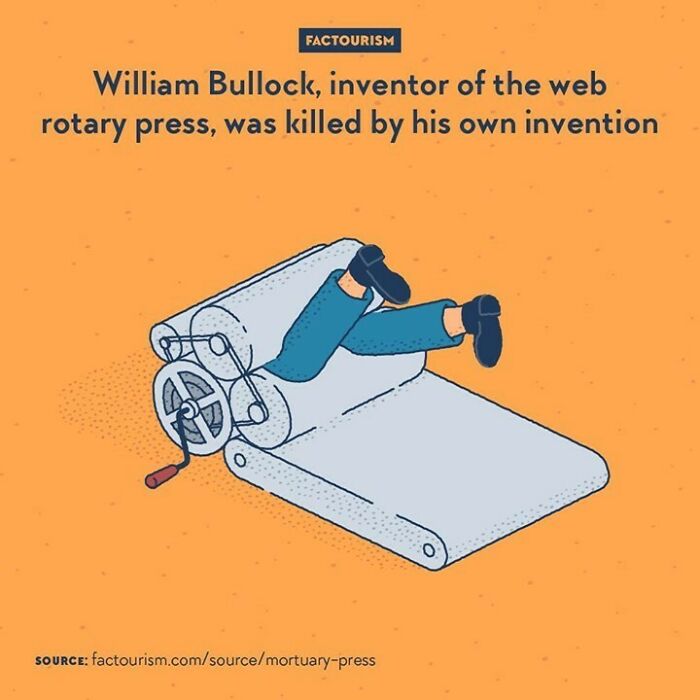
Image credits: factourism
#82
Eggplants contain nicotineThree doctors measured the amount of nicotine in plants of the nightshade family: comprising tobacco, they also include aubergines, but also tomatoes and potatoes, all species containing nicotine. A sample result: ten kilogrammes of eggplants, or aubergines, provide as much nicotine as one cigarette.
Image credits: factourism
#83
We have launched so many things into orbit – many that are not in use anymore and that has been left crumbling there – that the Earth is now surrounded with a lot of debris. Scientists at the European Space Agency estimate that there are around 29,000 objects that are larger than 10 cm out there. Add to that objects that are between 1 and 10 cm, about 670,000 of them, and the 170 million things that are in between 1 mm and 1 cm. All of these are very harmful to any new spacecraft or satellite, which have to fly through this layer of junk without encountering any.
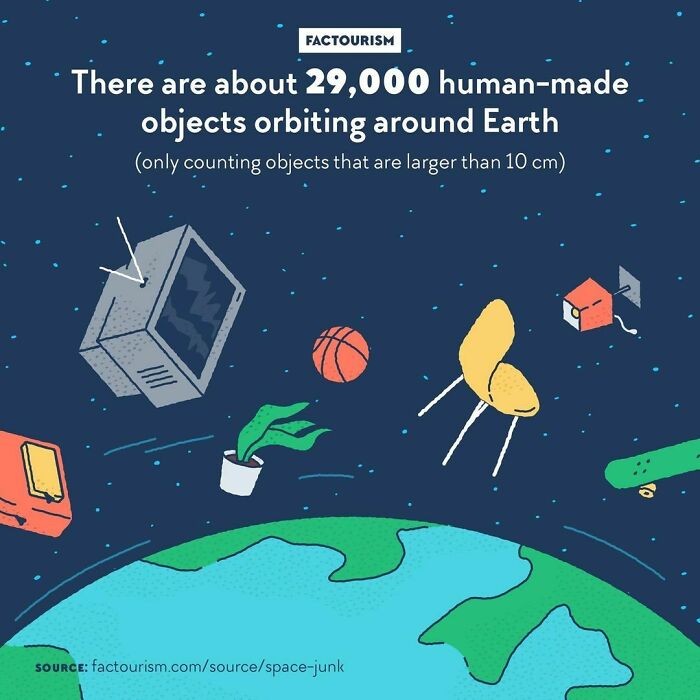
Image credits: factourism
#84
McDonald’s once made bubblegum flavoured broccoliIn an failed attempt to provide slightly healthier menus for kids, McDonald’s developed a few years ago a broccoli with bubblegum flavour as a test. It did not work: kids testing it were confused by the taste more than anything, and the idea was quickly dropped.
Image credits: factourism
#85
Salmon, sardines and mackerel are all fish that have a good amount of fatty acids, in particular omega-3, which helps with hair health, shininess and loss prevention. The fish also have protein and biotin, which can improve hair strength and prevent breakage.
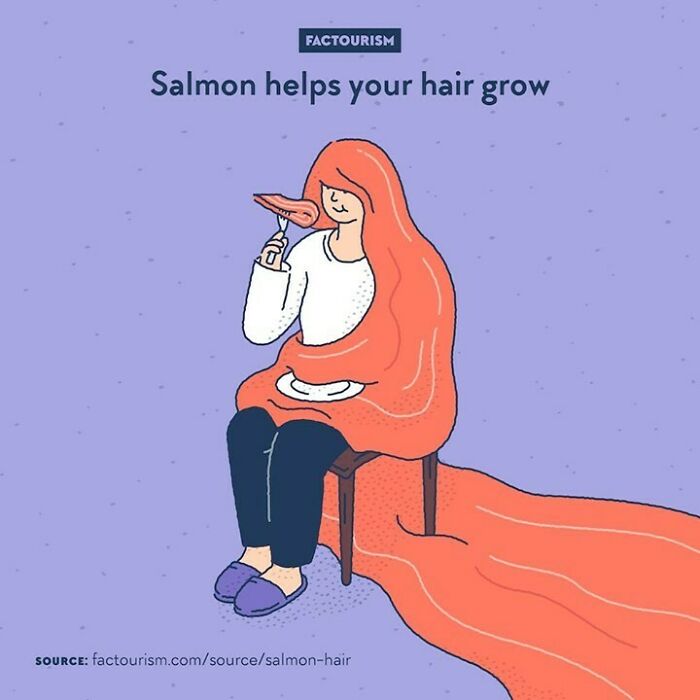
Image credits: factourism
#86
In 2014, two scientists on a mission in Antarctica, one housed in a tent from a field camp in the Dry Valleys, another staying at the McMurdo Station, had the same idea: checking Tinder. No profiles appeared at first, but when extending the radius of the search, they found each other. It turned out they matched! As for actually going on a date, they did manage to meet up once, but that was the day before one of them was leaving the continent.
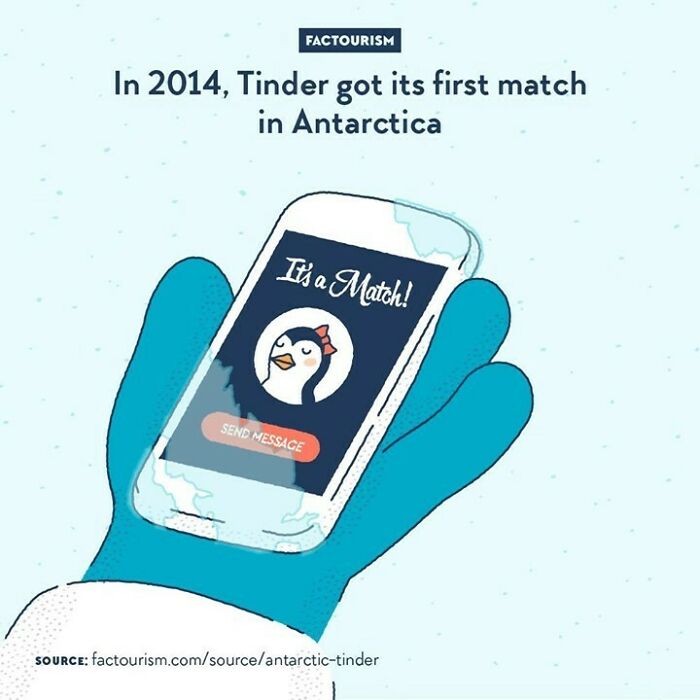
Image credits: factourism
#87
While not ideal and not really advised, coconut water has been used in multiple occasions as a hydration fluid, injected straight into blood, substituting a more standard saline solution that was otherwise not available.

Image credits: factourism
#88
On July 20, 1969, the Eagle lunar module landed on the Moon, Buzz Aldrin and Neil Armstrong on board. They stepped on it, said some nice words, planted a flag, walked around a bit. At one point however, they had to go home. So they flew off, but not before losing as much weight in the spacecraft as possible, especially since they picked up some nice rocks during their visit. Neil Armstrong’s boots are part of what has been jettisoned before returning home.
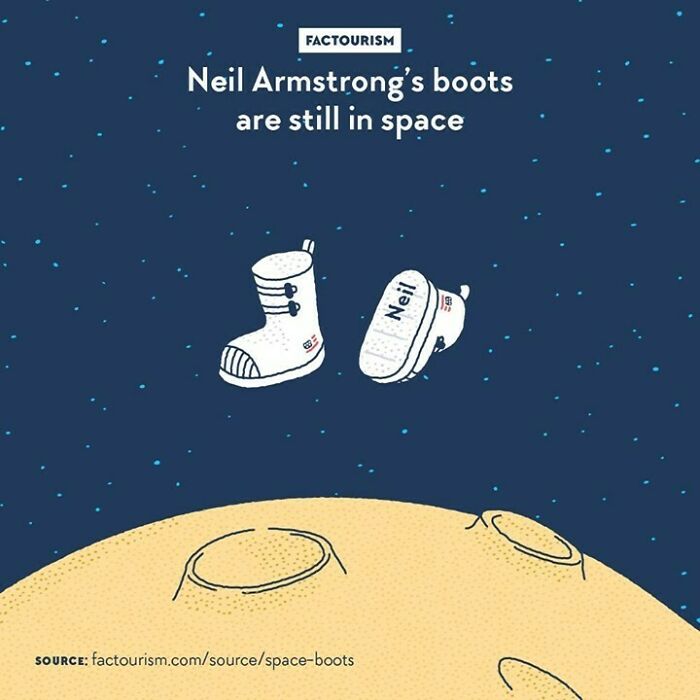
Image credits: factourism
#89
On February 20, 1947, a few fruit flies became the first animals from Earth to visit space. Sent by Americans, 11 years before the foundation of NASA, the flies were housed in a German missile that was seized at the end of World War 2. They reached a little more than 100 kilometres of altitude, just enough to be now considered as a trip to space. After being parachuted back, the flies were still alive, and studies showed they had not mutated – opening the way for a long series of missions sending various animals beyond the atmosphere, notably monkeys, dogs, and humans.
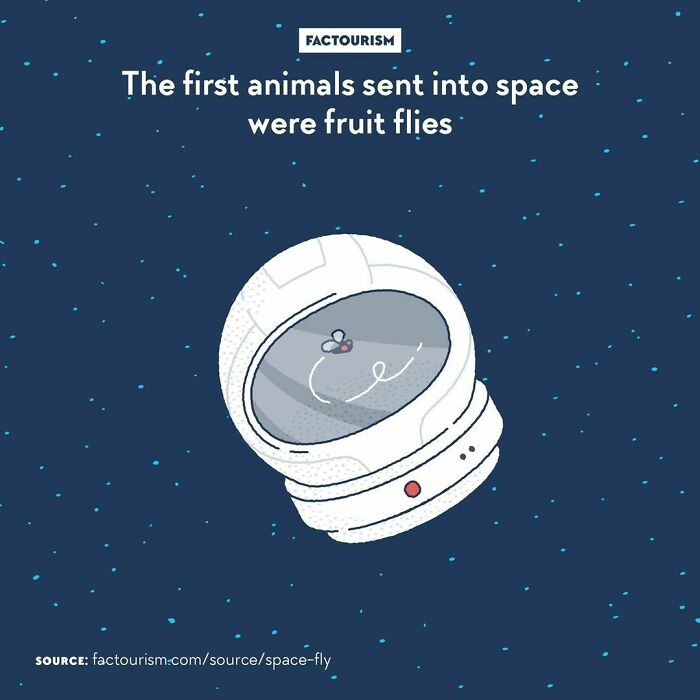
Image credits: factourism
#90
A flight from New York to Houston in 1973 took about 2,5 hours. It now takes almost 4 hours. This slowing down of flights is generalised. One reason has to do with fuel consumption: flying slower uses less fuel and airlines are making economies like this, especially in a time when the price of fuel raised a lot. Another reason is a practise known as “schedule padding”: airlines plan for generous flight times to avoid getting in the situation of being late.
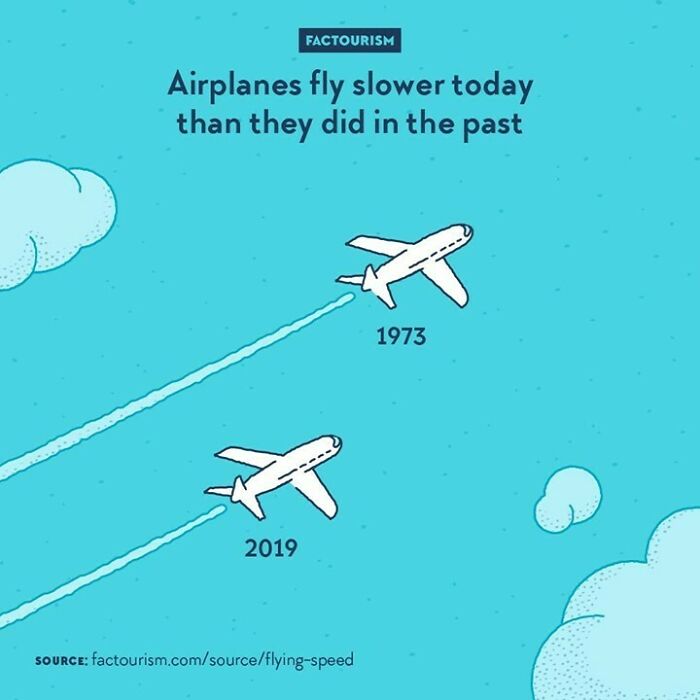
Image credits: factourism
#91
Blood can have different colours depending on its components. Most vertebrates have red blood due to its content in iron. Animals that have copper in their blood for instance have theirs blue (octopuses, squids, crustaceans, spiders, smurfs probably). Vanabin gives yellow blood (beetles, sea squirts, sea cucumbers), chlorocruorin makes for green blood (worms, leeches), and hemerythrin leads to purple blood (several sorts of worms).
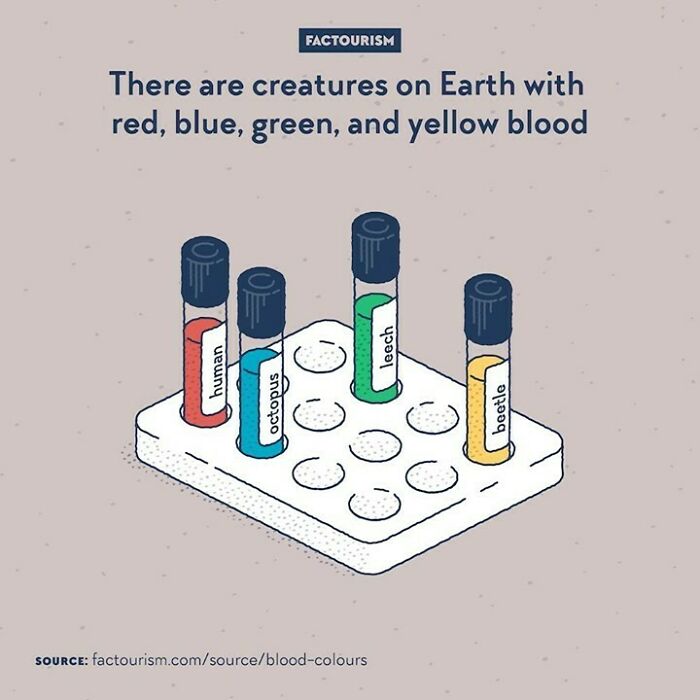
Image credits: factourism
from Bored Panda https://ift.tt/3g1cYfa

